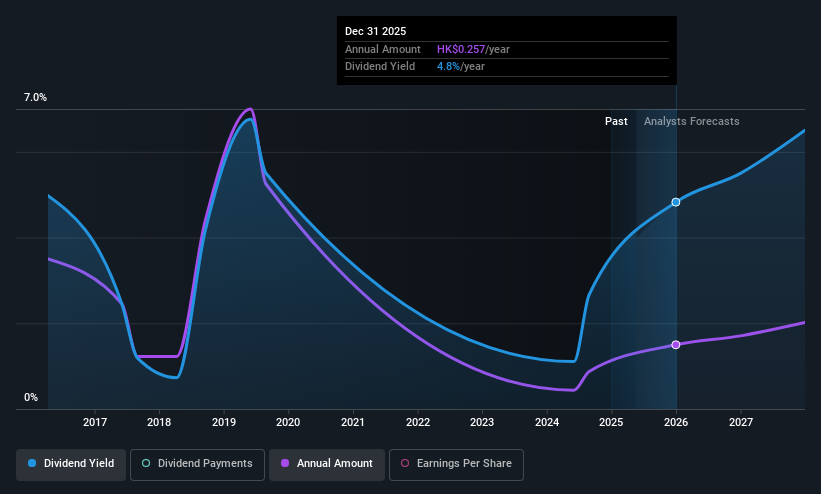Wynn Macau, Limited (HKG:1128) Is About To Go Ex-Dividend, And It Pays A 7.0% Yield
Regular readers will know that we love our dividends at Simply Wall St, which is why it's exciting to see Wynn Macau, Limited (HKG:1128) is about to trade ex-dividend in the next 4 days. The ex-dividend date is two business days before a company's record date in most cases, which is the date on which the company determines which shareholders are entitled to receive a dividend. The ex-dividend date is of consequence because whenever a stock is bought or sold, the trade can take two business days or more to settle. Accordingly, Wynn Macau investors that purchase the stock on or after the 27th of May will not receive the dividend, which will be paid on the 11th of June.
The company's next dividend payment will be HK$0.185 per share, and in the last 12 months, the company paid a total of HK$0.37 per share. Calculating the last year's worth of payments shows that Wynn Macau has a trailing yield of 7.0% on the current share price of HK$5.32. If you buy this business for its dividend, you should have an idea of whether Wynn Macau's dividend is reliable and sustainable. So we need to investigate whether Wynn Macau can afford its dividend, and if the dividend could grow.
Dividends are typically paid out of company income, so if a company pays out more than it earned, its dividend is usually at a higher risk of being cut. Wynn Macau paid out a comfortable 42% of its profit last year. That said, even highly profitable companies sometimes might not generate enough cash to pay the dividend, which is why we should always check if the dividend is covered by cash flow. The good news is it paid out just 12% of its free cash flow in the last year.
It's positive to see that Wynn Macau's dividend is covered by both profits and cash flow, since this is generally a sign that the dividend is sustainable, and a lower payout ratio usually suggests a greater margin of safety before the dividend gets cut.
Check out our latest analysis for Wynn Macau
Click here to see the company's payout ratio, plus analyst estimates of its future dividends.

Have Earnings And Dividends Been Growing?
Businesses with shrinking earnings are tricky from a dividend perspective. If business enters a downturn and the dividend is cut, the company could see its value fall precipitously. With that in mind, we're discomforted by Wynn Macau's 8.9% per annum decline in earnings in the past five years. Such a sharp decline casts doubt on the future sustainability of the dividend.
Many investors will assess a company's dividend performance by evaluating how much the dividend payments have changed over time. Wynn Macau has seen its dividend decline 5.2% per annum on average over the past nine years, which is not great to see. It's never nice to see earnings and dividends falling, but at least management has cut the dividend rather than potentially risk the company's health in an attempt to maintain it.
To Sum It Up
Should investors buy Wynn Macau for the upcoming dividend? Wynn Macau has comfortably low cash and profit payout ratios, which may mean the dividend is sustainable even in the face of a sharp decline in earnings per share. Still, we consider declining earnings to be a warning sign. It might be worth researching if the company is reinvesting in growth projects that could grow earnings and dividends in the future, but for now we're not all that optimistic on its dividend prospects.
In light of that, while Wynn Macau has an appealing dividend, it's worth knowing the risks involved with this stock. Every company has risks, and we've spotted 4 warning signs for Wynn Macau (of which 2 shouldn't be ignored!) you should know about.
Generally, we wouldn't recommend just buying the first dividend stock you see. Here's a curated list of interesting stocks that are strong dividend payers.
Have feedback on this article? Concerned about the content? Get in touch with us directly. Alternatively, email editorial-team (at) simplywallst.com.
This article by Simply Wall St is general in nature. We provide commentary based on historical data and analyst forecasts only using an unbiased methodology and our articles are not intended to be financial advice. It does not constitute a recommendation to buy or sell any stock, and does not take account of your objectives, or your financial situation. We aim to bring you long-term focused analysis driven by fundamental data. Note that our analysis may not factor in the latest price-sensitive company announcements or qualitative material. Simply Wall St has no position in any stocks mentioned.
 Wall Street Journal
Wall Street Journal